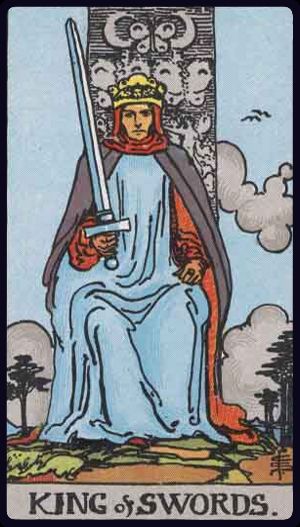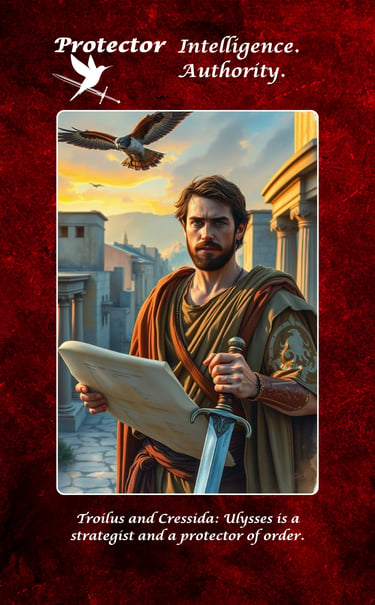Protector (King) of Swords
In the traditional deck...


The King of Swords represents mastery of intellectual power, ethical authority, and the ability to make just decisions based on clear thinking and moral principle. This card symbolizes someone who has achieved complete command of their mental faculties and uses that mastery to create order, provide guidance, and protect truth and justice. The King of Swords embodies the highest expression of intellectual leadership—combining sharp analytical ability with wisdom, fairness, and the courage to make difficult decisions that serve the greater good. This card often appears when situations require impartial judgment, strategic thinking, or the kind of principled authority that can cut through confusion and establish clarity. The King of Swords reminds us that true intellectual power is not about domination or showing off cleverness, but about using mental gifts to create structure, maintain justice, and guide others toward truth and understanding with both strength and compassion.
In the Shakespeare deck...


Ulysses standing with sword and scroll before the city of Troy, with a magnificent bird of prey soaring overhead, perfectly embodies the Protector of Swords' integration of intellectual authority, strategic wisdom, and principled leadership. His dual symbols—the sword representing his power to enforce decisions and the parchment representing law, order, and thoughtful planning—show how the King of Swords balances force with wisdom, action with contemplation. The city behind him represents civilization itself, which depends on leaders who can maintain order through just authority and clear thinking rather than mere power or charisma. The bird of prey flying overhead symbolizes his elevated perspective and predatory intelligence that can see patterns and connections others miss, while its freedom of flight represents how true intellectual mastery liberates rather than constrains. Ulysses's famous "degree speech" about order and hierarchy demonstrates the Protector of Swords' essential function: using intellectual clarity to understand and articulate the principles that hold society together, even when those truths are uncomfortable or challenging to accept.
Interpretation...
When the Protector of Swords appears, you're being called to step into a role of intellectual leadership and principled authority, using your mental clarity and strategic thinking to create order and guidance for others. This card suggests you may be in a position where others look to you for impartial judgment, wise decisions, or the kind of clear thinking that can resolve complex problems and conflicts. The Protector of Swords indicates you have both the intellectual capacity and the moral authority to make difficult decisions that serve the greater good, even when they're unpopular or personally costly. Like Ulysses understanding the necessity of order and hierarchy, you may need to articulate and enforce principles that maintain stability and justice, using both your analytical abilities and your ethical compass to guide your choices.
Advice...
Use your intellectual gifts and strategic thinking to create order and provide guidance for others who may be confused or directionless
Make decisions based on clear principles and long-term consequences rather than immediate popularity or personal advantage
Balance the authority of your position with genuine service to truth, justice, and the wellbeing of those under your protection
Communicate difficult truths and necessary decisions with both clarity and compassion, helping others understand the reasoning behind your choices
Take the elevated perspective that allows you to see patterns and connections that others might miss in the midst of immediate concerns
Remember that true intellectual authority comes from consistently demonstrating wisdom, fairness, and genuine concern for the greater good
Use both force and persuasion as appropriate—knowing when to enforce decisions firmly and when to guide through patient explanation and example